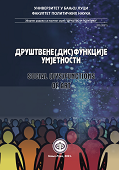ZABORAVLJENI LJUDI SIGMUNDA FROJDA: POLITIČKI ASPEKT KULTURE SEĆANJA U ČITANJU GOCETA SMILEVSKOG
SIGMUND FREUD’S FORGOTTEN PEOPLE: THE POLITICAL ASPECT OF CULTURAL MEMORY IN THE READING OF GOCE SMILEVSKI
Author(s): Petra V. MitićSubject(s): Macedonian Literature, Psychoanalysis, Sociology of Culture, Sociology of Literature
Published by: Fakultet političkih nauka Univerziteta u Banjoj Luci
Keywords: Goce Smilevski; politics of reading; psychoanalysis; woman’s identity; alternative history; cultural memory;
Summary/Abstract: Using the specific form of fictional reconstruction, the author of Freud’ sister (Smilevski, 2019) has given the voice of the narrator to a woman who was at least doubly fogotten. She was recorded as just a marginal figure by the official history, but she was also, through the irony of circumstance, and together with the three other sisters, forgotten by the most beloved and the one who was closest to her - her own brother. The brother is no less than the famous creator of psychoanalysis, which aimed not only at redefining the crucial mechanisms of man’s existence, but also at determining the nature of woman, her position and her role within culture, history and civilization. Limited by her own sex which reduces her potential for sublimation and creativity, she is, according to Freud, destined to remain in the shadow of man’s cultural achievements. If she takes a positive stance by accepting this role allotted to her sex, she will be able to fulfill the purpose of her femininity and will abstain from attempting to subvert the progress of culture. The reader as a political figure and the one who participates in the ghostly romance can’t help seeing the two voices as similar to two bells perpetually clashing against each other, two different ways of perceiving reality unable to find the common ground, while some of the darkest moments in history are going on. Even though one of these two has established the authority of its own insights in the legacy of historical and cultural memory, while the other has been silenced into nonexistance, Smilevski has written an alternative history and cultural memory, demonstrating that this other voice – that of the forgotten women – does not only convey a greater degree of authenticity, but also a more profound and a more humane understanding of life and reality.
Journal: Društvo i politika
- Issue Year: 2/2021
- Issue No: 2
- Page Range: 121-139
- Page Count: 19
- Language: Serbian

